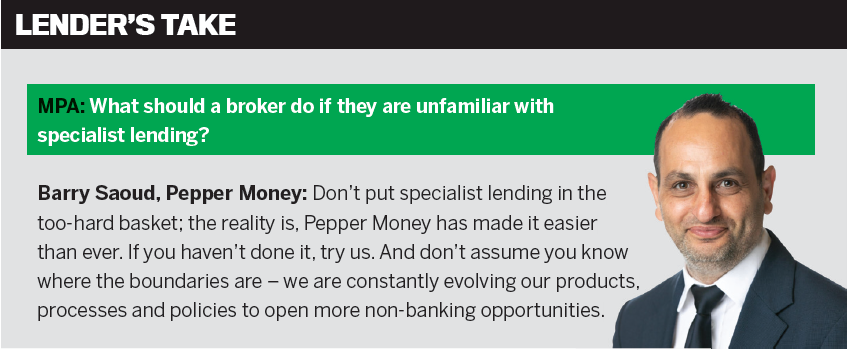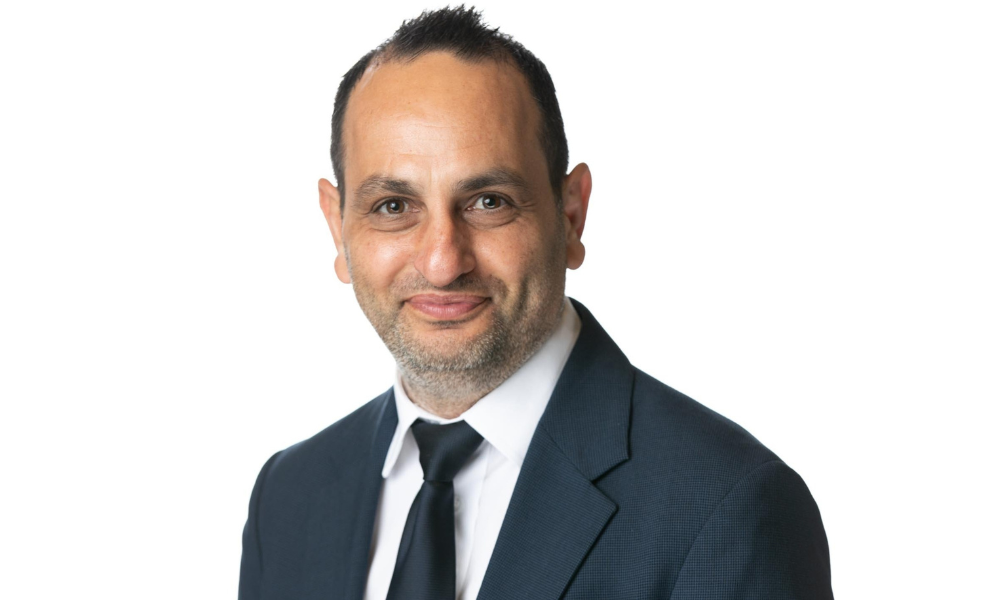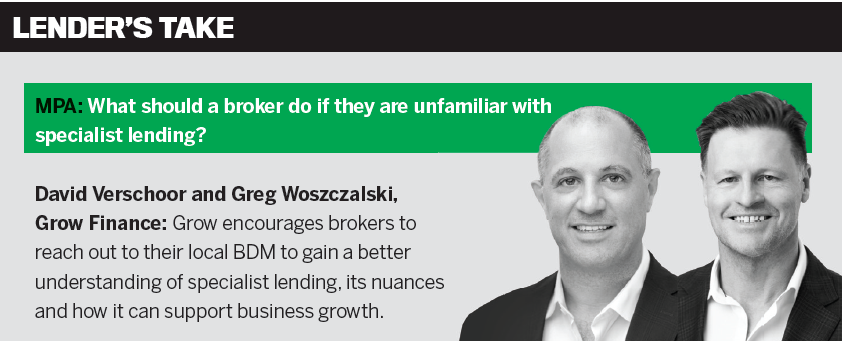Non-banks assist customers who don’t fit typical borrower profile

What a difference a year makes in the world of finance.
Twelve months ago, the Reserve Bank of Australia’s official cash rate was sitting at 0.10%, the property marketing was booming, and lenders were experiencing unprecedented home loan growth. Fast-forward to March 2023 and the cash rate is sitting at 3.60%, the real estate market has softened, and traditional lending growth has taken a hit.
Mortgage holders are now dealing with rising interest rates and inflation, with many looking to refinance for a better deal, and almost 70% relying on a broker to help them do so. Brokers can navigate a vast market to find the right finance solutions to suit their customers’ needs. But what about those customers who fit outside the traditional borrower mould, such as the self-employed, or small business owners?
There is one sector that focuses on these types of customers and can provide specialist lending products: the non-bank lenders.
MPA caught up with some of Australia’s leading non-banks to explore specialised lending and hear how brokers can tap into this growing customer segment. We spoke to Liberty group sales manager John Mohnacheff, Pepper Money general manager mortgage and commercial lending Barry Saoud, La Trobe Financial chief lending officer Cory Bannister, Resimac regional sales manager Rodney Cottam, Grow Finance co-CEOs David Verschoor and Greg Woszczalski, and OnDeck Australia CEO Cameron Poolman.
Customer profile and broker benefits
Not all non-bank lenders agree on an exact definition of specialist lending; it depends on the non-bank and the types of customers it caters for. But what’s unanimous is that specialist lending is on the rise.
At La Trobe Financial, Cory Bannister says a specialist borrower generally requires manual desktop underwriting credit assessment techniques, as they often can’t be analysed appropriately by automated under-writing tools used by conventional banks.
“A common misconception is that specialist borrowers have impaired credit, which is often not the case; these borrowers often fail conventional bank acceptance criteria due to factors such as their form of income verification, their credit profile, age, variability of income or expenditure, or simply because they’re seeking a product that’s no longer being offered by the major banks, such as in the case of an SMSF,” says Bannister.

For brokers, specialist borrowers represent around 30% of the market, he says. “Three out of every 10 clients, be it existing or prospective, are likely to require a specialist solution, so the opportunity is significant and shouldn’t be ignored.”
He says the benefits for brokers include:
- diversified revenue sources – spreading the risk rather than sourcing all of their income from one asset class or borrower type
- expanded business capability – appealing to customers who would not have otherwise been attracted to their business; and vali-dating the importance of finance brokers
- protection of their existing customer base –the more solutions a broker can provide to their clients, the more likely they are to stick
- opportunities under their nose – brokers already have all the lead generation tools they need to make the transition to specialist lending: their CRMs
Pepper Money’s Barry Saoud (pictured below) says there are no agreed terms in the industry for categories of loans.

“Specialist loans in this article actually mean non-bank [loans],” he says. “Non-bank loans cover a range of categories of loans, all designed to provide flexible financial options for borrowers who don’t meet the requirements of banks for a wide range of reasons.”
There are key reasons a borrower won’t meet the lending requirements set out by traditional lenders, Saoud says. “For some it may be a case of not meeting credit-scoring requirements; for others it may be down to an impaired credit history – or for some, because they can’t provide traditional income verification documents.”
Income is a good example, he says, as many clients earn money in non-traditional ways, from the self-employed to shift workers, casual workers, people with multiple jobs and people with income from benefits.
“That’s where a non-bank like Pepper Money has the flexibility to make lending for these real-life situations possible. We’ve always been passionate about providing real-life solutions, particularly in the more complex specialist lending category, where people are doing it toughest. If we can find a way to help, we will. We are constantly uncovering yeses when there are nos, and we keep testing the boundaries.”
Saoud says this doesn’t just include home loans; the non-bank works with people and businesses – “blue-chip to blue-collar” – across all categories of lending, from home loans to commercial loans and personal loans.
John Mohnacheff (pictured below) says Liberty recognises the critical role specialist loans play in the market. “As rates change, it’s more important than ever to support customers who may not fit the traditional lending mould,” he says. “We pride ourselves on offering personalised finance solutions to suit a customer’s unique circumstances.

“As champions of diversification and inclusivity, we were one of the first Australian lenders to offer specialist loans. Our ability to tailor lending solutions to customers’ needs has empowered our brokers to help more people achieve their financial goals, even where customers have a less-than-perfect credit history.”
Rodney Cottam from Resimac says customers who fall just outside the scope of traditional lending policy can benefit from specialist home loan products.
“A typical borrower is the self-employed,” Cottam says. “There are other categories of customer, too. One of these is people who have experienced temporary financial hardship due to an event such as a health condition or relationship breakdown. Another category is people who have accumulated a range of debts and want to consolidate them. There are also those who may have unconventional income or short-term employment.”

Serving self-employed borrowers can help brokers in a number of ways, Cottam says. “One valuable benefit is diversifying your customer base. Given the challenging market, this could be particularly useful in 2023.”
He says these types of customers can also create new referral networks for brokers.
“Self-employed traders are a community in themselves and often recommend products and services to each other. They know that brokers and lenders who specialise in serving the self-employed are few and far between.”
Cottam says the other benefit for brokers is keeping a customer longer.
“In the current macroeconomic environment, self-employed borrowers need brokers now more than ever,” he says. “A broker who serves this kind of client could be helping them overcome a tough period in their life. This usually puts the borrower on a path to being a prime customer later on, which Resimac can assist with.”
Grow Finance co-CEOs David Verschoor and Greg Woszczalski (pictured below) say SMEs can benefit from specialist loans to help support growth and alleviate cash flow challenges.

“Grow is increasingly being recognised as the ‘non-bank of choice’ for business by providing funding that holistically meets SMEs’ cash flow needs,” they say.
“The company’s point of difference is its ability to respond to current and emerging market demand with sharply priced product enhancements, product extensions and new products – both single and blended.”

Verschoor and Woszczalski say that diversifying into specialist lending deepens client relationships and increases revenue. “To support diversification, Grow has offices in Sydney, Melbourne, Brisbane and Perth and has a BDM presence in all states. Each BDM has a designated account manager to enhance efficiencies. High-touch BDM support is backed by Grow’s highly sophisticated technology, which is intuitive, automated and expedites the loan application process.”
Cameron Poolman says OnDeck combines data, tech and people to better understand the health of Australian small businesses. “This allows us to take the friction out of lending and provides faster and more consistent decisions and a more personalised experience for our brokers and their small business customers,” he says.
“We are passionate about small business and strive to set a new standard for business lending in Australia. We’ve made a conscious decision to ensure all our loans are unsecured, so when a broker comes to us, we will never ask for asset security as part of our process.”
Poolman says OnDeck’s highly trained and passionate team understand a broker’s customers and will help them grow their businesses.

Broker awareness
With the rapid change in interest rates, Mohnacheff says brokers and customers are looking for innovative and creative ways to get a foot in the market. “Customers may look a little different now than they have traditionally, some with multiple debts or a small deposit,” he says.
“This is where non-banks – like Liberty – can make a huge impact. Since day one, Liberty has been dedicated to a free-thinking way of doing finance, and this attitude has allowed us deliver highly competitive lending solutions.”
Mohnacheff says it is Liberty’s mission to help brokers “grow more”, so it continues to create new ways to educate brokers about how the non-bank can help.
“From our focused team of BDMs, under-writers and support personnel to the launch of the Liberty IQ app to track your loan progress, Liberty goes above and beyond to support our network,” he says.
Verschoor and Woszczalski say broker awareness of specialist lending and commercial finance is definitely increasing, and they expect this upward trend to continue.
Cottam (pictured below) points out that those brokers who haven’t tried specialist lending might assume these customers are harder to serve.

“It helps to know your lenders,” he says. “Not all lenders offer alt-doc products. We find brokers who know that Resimac specializes in this area are quick to take advantage of our solutions.”
Many clients are also unaware of what’s possible with specialist lending, Cottam adds. “Debt consolidation is a great example of a little-known tool that provides major benefit. We can certainly educate more brokers and clients about lending solutions for self-employed borrowers, and our highly skilled BDM team is there to provide the required support.”
Saoud says a lot of brokers are aware of the growing cohort of borrowers who require a specialist loan, but equally there are misconceptions about non-bank lending to address. He says there are four specific points Pepper Money wants to make:
- Non-banking is not short-term
“We hear some brokers positioning the non-bank option as a short-term solution for their specialist clients; however, that’s just not the case,” Saoud says. “We can and do work with brokers to refinance clients as their situation changes into a more suitable product.”
Clients might start out with a complex situation that requires one product, but if their circumstances change, “we’ve got the ability to then product-swap them into another, which could mean a lower rate. So it’s a mistake to think of us as a short-term solution when we can be there for the long-term journey”.
- Non-bank lending is not just residential
There’s a need to build brokers’ aware-ness of the non-bank opportunity beyond residential lending, Saoud says. “Commercial lending is on the rise, and the demand is strong. Commercial loans settled by mortgage brokers recorded their highest-ever value at $15.98bn, up $5.71bn or 55.5% year-on-year.”
- Non-banking is not standing still
It’s crucial to keep up to date as things change. One example is Pepper Money’s recent and welcome removal of clawback on commercial loans, Saoud says. “We’re also expanding our ability to fund commercial properties across Australia and have simplified our fees and reduced legal charges.”
- Non-bank lending is really rewarding
The value proposition of a broker has never been more relevant, with brokers uniquely placed to offer customers the broadest range of lending options, says Saoud.
“I think we’ll see even more of this in 2023 as customers will be looking to brokers for guidance and support as they navigate through a different – and increasingly difficult – landscape. When a broker finds a specialist solution for these customers, we know it’s genuinely rewarding … you will earn their trust and have an advocate for life.”
Poolman (pictured below) says OnDeck is seeing significant demand for finance from the small business community, and much of this is backed by growth in lending across the broker channel.

Two in three commercial brokers are familiar with the OnDeck brand, while one in two mortgage and finance brokers “know who we are and what do”, he says.
Bannister says brokers’ awareness of specialist lending has improved significantly in recent years, in part due to the great work done by lenders like La Trobe Financial.
“They remained committed to brokers and their clients to ensure overlooked borrowers were given access to appropriate financial solutions, and also due to the pandemic where specialist solutions were in strong demand,” he says. “We expect this to continue as we work through what is currently a complex and uncertain financial environment.”
Value proposition for brokers
Specialist lending is Grow’s core business, say Verschoor and Woszczalski. The lender’s aim is to provide quick, easy access to capital to support growth and the more efficient operation of businesses.
“The company’s value proposition is that it provides a comprehensive suite of business funding solutions that holistically meet SMEs’ cash flow needs,” the CEOs say.
Cottam says self-employed borrowers are of great importance to Resimac.
“In November, specialist and near prime products were used for about 70% of broker settlements. The popularity of these products is growing month-on-month, and we expect it to continue this year,” he says.
Of OnDeck, Poolman says: “We are not a bank and won’t treat brokers or their customers like one. Our value proposition focuses on speed and consistency, exceptional customer service and providing our customers with unsecured business loans.”

OnDeck can make faster lending decisions by gaining a better understanding of the health of Australian small businesses, he says. “Our Lightning Loans® provide a decision in minutes and funding in hours – typically two to four, with instant decisioning coming soon.
“Thanks to our unique KOALA Score™ credit algorithm, we can provide unsecured, larger loans to more small businesses, including sole proprietors and partnerships, with more options on terms from six to 24 months to help balance repayments along with business cash flow.”
Resimac is focused on self-employed borrowers and is constantly improving its products and policy to ensure they fit an evolving market. Cottam says one of its recent improvements was to allow 90% of rental income for servicing, which shows Resimac is ensuring its guidelines are in line with market trends and “we’re open to write more business and service more customers”.
“Our national BDM team is an enormous asset to brokers,” Cottam adds. “It has a wealth of experience in self-employed borrowers, customer types, and knowledge of credit guidelines and products. This means we can workshop scenarios quickly with brokers.”
Bannister (pictured below) says La Trobe Financial has one of the broadest product ranges in the market, covering first home buyers, upgraders, down-sizers, the self-employed, those looking to build a home, right through to those looking to build their retirement nest egg via an SMSF loan.

He says all these products can become a ‘specialist loan’ when borrower circumstances support it – such as variability in income, a change in employment, minor credit impairment, being self-employed without up-to-date financials, or being in a market segment that would have been classified as ‘prime’ by the major banks a short time ago but is no longer.
“A borrower’s circumstances change regularly, as do lenders’ appetites,” Bannister says. “It’s often the case that a borrower is a specialist customer today, with more options available tomorrow.”
The changing dynamic of a borrower’s circumstances throughout their life provides a proof point of the broker customer value proposition,” he says. “By helping a customer navigate a complex and uncertain path, you will earn their trust and create a customer for life.”
Mohnacheff says that for over 25 years Liberty has led the industry in specialist lending. “We know there’s more to a customer’s story than just their credit score,” he says. “Our highly tailored, flexible lending solutions across a range of products are designed to help customers get closer to their financial goals.”
Liberty’s personalised approach to lending means brokers are equipped to support a broader range of customers, says Mohnacheff. “We dedicate a credit assessor to review every loan application and ensure we’re considering the bigger picture. By taking the time to completely understand a customer’s circumstances and goals, brokers can work with Liberty to find a bespoke lending solution for their client.”
Sector growth, market trends
With rising interest rates, increasing cost of living pressures, and many borrowers starting to come off fixed rates, Saoud says “specialist lending is likely to see increased demand. There are borrowers who would have been considered bank borrowers just two years ago who may be locked out of a loan today with a major bank and instead fall into the category of specialist non-bank borrowers.”
Saoud says borrowers with a few defaults or arrears on their existing loans will be turned away from mainstream banks until a significant amount of time has passed. “Specialist lending gives these borrowers the chance to consolidate their debts and considers the whole picture. I think we’re going to see the needs of many borrowers evolve in this shifting and volatile environment; as a result, greater appetite for specialist lending options – more so than ever.”
Cottam says the self-employed niche is certainly growing for Resimac. “We’re finding more of these borrowers needing relief due to rising interest rates, inflation and high levels of other consumer debt. The latter is leading many borrowers to debt consolidation so they can lower their overall monthly repayments and simplify their outgoings.
Resimac sees more opportunities for the non-bank in 2023 as rates rise further and many borrowers’ fixed-term mortgages expire. “Resimac will be working with brokers to maximise our impact and bring financial relief to these borrowers,” Cottam says.
Verschoor and Woszczalski say there is increasing demand for commercial finance in the non-bank sector to offset the tightening of risk appetite at the traditional lenders and support emerging business requirements that fall outside these lenders’ profiles. They predict the following trends in 2023:
- Growth in domestic manufacturing
- Businesses increasingly diversifying operations and becoming less reliant on imports and offshore manufacturing –driving demand for asset finance
- An increase in civil construction projects
- Significant demand for equipment funding
- Sustained demand for working capital
- Sustained demand for business loan products to help smooth out cash flow and support trade through seasonal periods
- Supply chain easing
- Easing of import delays for offshore stock
- A preference for fixed rate products
- SMEs predominantly preferring fixed rate contracts to offset economic uncertainty
- Consistent demand nationally
- Consistent demand for specialist finance nationally
Poolman says OnDeck recorded a 35% surge in loan approvals in January 2023, with much of this extra business driven by finance approvals for transport and hospitality.
“Transport lending is being driven by logistics demands for more trucks, servicing of the trucks, servicing their payment terms, and managing operating costs such as higher fuel costs,” Poolman says. “Cafes, bars and restaurants are using loan funds for stock and to hire more staff.”
Mohnacheff says Australians have witnessed a huge shift over the last three years, changing the way many approach finance. “We believe specialised lending will play an essential role going forward. With bespoke lending solutions becoming more known and advantageous to many, we expect this area to continue to grow.”
Due to higher rates, Mohnacheff expects to see more first home buyers look to specialist lending solutions to get a foot on the property ladder. “Liberty’s extensive range of free-thinking loans will provide many with the opportunity to enter the market and build their equity sooner than expected.”
At La Trobe Financial, Bannister expects demand for specialist loans to only intensify. “We are terrifically positioned, along with the other major NBFIs and, importantly, brokers, to play one of the most important roles in the mortgage lending space over the next two to three years.”
The financial landscape is likely to remain complex and uncertain in the short to medium term, Bannister says. Australians will need the support and guidance of brokers and non-banks to ensure credit is appropriately provided.
“We will continue to focus on both the specialist or ‘complex prime’ segments to ensure those that are underserved are well catered for. As a result, we expect to see broker share holding above 70% and continuing to climb towards 75% plus, and we expect to see NBFI market share heading back to 10% and beyond.”
Support for brokers
Resimac BDMs are always looking to do more for their aggregator and broker partners, says Cottam, from training to business advice, workshopping scenarios and more. “We have BDMs in most states and territories who can give hands-on advice about specialist lending from their years of experience,” he says. “Our BDMs are also adept at working with accountants and financial planners so we can find the best solutions to borrowers’ needs.”
Cottam says the main skill a broker needs is a willingness to learn. “Lending to self-employed borrowers may involve learning about tools such as income verification and debt consolidation, and our BDMs are ready to help.”
Grow Finance has BDMs in all states, say Verschoor and Woszczalski. “Each BDM has a designated account manager to enhance efficiencies. High-touch BDM support is backed by Grow’s highly sophisticated technology, which is intuitive, automated and expedites the loan application process. In addition, the company provides regular product training and spearheads education initiatives.”
Verschoor and Woszczalski say brokers need basic commercial acumen to write more commercial loans; this involves understanding the client’s business, why they are seeking funding, and which lender to approach for the aligned solution.
Liberty’s goal is to empower brokers to help people get financial, Mohnacheff says. “With a flexible loan offering and dedicated support, Liberty can help brokers find suitable lending solutions for more clients. We have a dedicated and experienced BDM team on the road who can answer any queries and help brokers achieve the best possible results.”
Mohnacheff says Liberty’s regular Grow More sessions broaden brokers’ under-standing of specialised lending and high-light opportunities to assist more clients. Specialised lending can be an intimidating area for new brokers to dive into, he says, but Liberty’s experienced support team simplify the process so it’s not significantly different to a conventional loan application.
Bannister says there’s no difference between a broker’s approach to selling a conventional prime loan and selling a specialist loan – the process is the same. “By following responsible lending guidelines – making reasonable enquiries as to the borrower’s financial situation, requirements and objectives – brokers are well equipped to complete a near prime loan application.”
La Trobe Financial works with brokers to achieve the desired outcome, leveraging the significant experience of its credit team. Bannister says being one of the largest non-banks, its team can help a broker over-come unfamiliar obstacles.
“It’s important for lenders to support brokers who are not familiar with certain products or situations and to encourage them to explore these options, assisting them with growing their businesses,” Bannister says.
Poolman says moving into small business lending may take brokers outside their comfort zone, but they don’t need extensive experience in that space to grow a revenue stream, and “it adds diversity to a broker’s business, which makes sense in a slower property market”.
“OnDeck’s ‘hi-tech, hi-touch’ philosophy means our experienced BDMs are available to walk a broker through our loan processes. So brokers typically get up to speed very quickly,” Poolman says. “Importantly, OnDeck’s BDMs are heavily involved in each scenario and loan application. They are there to nurture the deal from end to end to make sure we deliver the highest level of service to each broker. Brokers can be reassured they only deal with one person at OnDeck.”
Saoud says Pepper Money has made non-bank lending easy to do. “We’ve invested heavily over the past 24 months, perfecting the products, processes, people, policy and technology to make non-bank lending easy.”
Pepper Money research shows that some brokers think non-banking is too hard. “But as soon as they give it a try, they realise how big an opportunity it is,” Saoud says. “And the reality is that we have made it easier than ever. If you haven’t done it, try us.
“Don’t assume you know where the non-bank boundaries are either. We are constantly evolving our processes, products and policies to adapt with the market and your clients’ changing needs.”
Saoud says Pepper Money is constantly investing in the technologies that support the “what, when and why of every interaction”.
“We offer best-in-class education, partnering with aggregators and brokers to deliver targeted education events and hands-on support from our great teams.”



